
The effects of the overturning of Roe v. Wade, which shattered the precedent for both the right to privacy and abortion in the U.S., are still rippling months later. In addition to steering recent politics, it’s also impacting interpersonal relationships — romantic and not.
In the latest Singles in America survey, an annual study of over 5,000 single people in the country conducted by Match, these effects are evident. Over 75 percent — 78, to be exact — of singles of reproductive age said that the overturning of Roe changed their sex life. This is understandable, considering the increased risk of a sexual encounter, and it’s especially true for young people.
Here’s a breakdown of how it’s specifically impacting daters:
-
25 percent overall (28 percent of Gen Z) say they’ll use or ask their partners to use condoms more often
-
20 percent overall (27 percent of Gen Z) are more hesitant to have sex
-
20 percent overall (27 percent of Gen Z) are more afraid of getting pregnant or getting someone pregnant
These fears translate into a change of dating habits. Some people, 13 percent according to Match, said the SCOTUS decision made them more hesitant to date.
Two out of three single women will not date a partner who has opposing views of abortion. Some, however, are tired of talking about it: A quarter of single women want to have less discussion about abortion attitudes with partners. That doesn’t account for everyone, though; 18 percent want to have more discussion about abortion attitudes.
Whether someone wants to talk about abortion or not, apolitical views aren’t wanted for about a third of people surveyed. Thirty-one percent of singles who said not having an opinion on key issues is a dealbreaker. For around the same number of singles, 31 percent, posting political views on social media is also a dealbreaker. These numbers are up from 16 percent and 11 percent in 2017 respectfully, an outcome of increasing political polarization
On the opposite side of the coin, 37 percent say that “having too strong an opinion is a dealbreaker.”
Both two major parties have their detractors, though Republicans more so: 33 percent of singles say supporting the GOP is a dealbreaker. For Democrats, that number is 23 percent.
On top of this, the Roe decision is influencing platonic relationships: 17 percent of singles have lost friends due to their differing abortion opinions.
Singles in America breaks down other topics relevant to daters, as well, but it’s clear that politics and Roe in general are at the top of some minds. As we continue to navigate a post-Roe world, we’ll continue to see consequences, from the macro of elections impacted to the micro of one person’s dating life.
